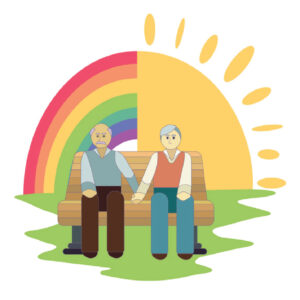What LGBT Older Adults Can Teach Us About Resilience
June 9, 2020 | LGBTQ+

June is Pride Month, a time to celebrate diversity and shine a light on the ways we can better serve the lesbian, gay, bisexual and transgender (LGBT) community. More than 2.7 million adults in the United States over the age of 50 identify as LGBT, and it’s expected that this number will double in upcoming years.
While awareness has increased amongst service providers in how to support the unique needs of the LGBT community as a whole, it is important to put additional efforts and resources into caring for the aging LGBT population.
Resilience in Overcoming Barriers
Older LGBT individuals have faced significant discrimination and victimization in their lifetimes, which unfortunately has affected both physical and mental health for many people. It’s been found that LGBT older adults face higher rates of mental distress, disability, and social isolation. LGBT older adults may fear they won’t have access to available services because of discrimination from healthcare providers. It can be difficult to trust healthcare providers and other “helping” professionals. More than 20% of LGBT older adults choose to not disclose their gender or sexual identity to their physician.
Many LGBT older adults have faced unparalleled levels of adversity but have emerged stronger and more resilient. Research has shown that individuals who have navigated key life events such as coming out, doing purposeful work, and forming strong relationships have achieved health and quality of life.
Social engagement and connectedness is a strength in the LGBT community. Many older LGBT adults have formed families of choice and benefitted from the support of partners and friends during the aging process. Some LGBT older adults report that feeling accepted in the LGBT community has created a sense of belonging. This has translated into life satisfaction and implementing healthy practices to support both physical and mental wellness. For example, LGBT older adults often engage in physical exercise and other wellness activities. One study showed that 25% of LGBT older adults regularly attend religious or spiritual activities.
Reducing Health Disparities in At-Risk Populations
It’s important that we understand more about the health and well being of aging LGBT members of our community. Service providers have more work to do to reduce the health disparities that are occurring. The right programs and interventions can be implemented to support LGBT aging adults and build upon their strength and resiliency.
At Windward Life Care, we are committed to supporting LGBT clients in aging well. Our SAGE Care Silver Certification signifies our commitment to staff training around the needs of LGBT older adults. We are here to help you find the aging care resources that are needed for you and your loved ones. Contact us to learn more about the available services.

